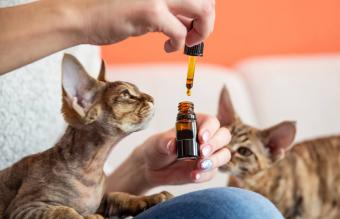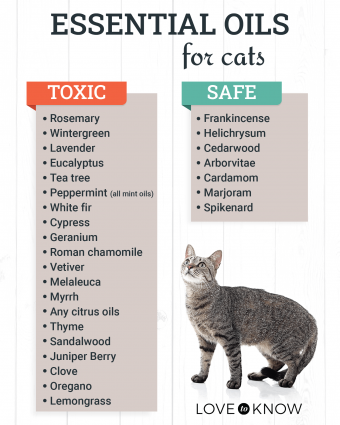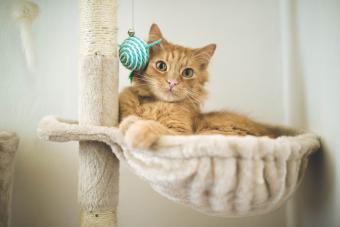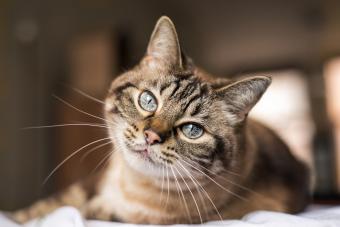
There is a shortlist of essential oils (EOs) safe for cats. The oils support your cat's body and help with specific health issues. EOs are meant to assist with health conditions like allergies and are not a cure for medical issues. Always see a vet if your cat is ill and pay close attention to the long list of toxic oils.
Essential Oils Safe for Cats
Essential oils are the extracts of plants known for medicinal properties. Cats are more sensitive to the effects of essential oils or EOs than dogs. The general rule of thumb is less is more with cats. Pet parents must always dilute oils when used on cats. Also, several oils are toxic to kitties, including all citrus oils.
Guidelines for Cats
Do not use EOs to cure your cat's health issue. An essential oil may help with a possible low-key condition. When purchasing any essential oils, it is important to use pure, therapeutic-grade oils. Different ailments call for varying amounts, and a holistic vet may recommend different ratios. For example, allergies call for one drop of frankincense. Pet parents need to dilute each drop with one teaspoon of fractionated coconut oil (FCO). The EO, in this case, may be used on the cat's paws.
Some Pets Are More Sensitive
Always apply oils externally. If you are concerned, your cat may lick the area put a 'cone' on your cat, and supervise. Essential oils may never be given by mouth or in the animal's food. Never apply oils to your cat's eyes, nose, or genitals. Cats may be overwhelmed by certain scents.

EOs Safe for Cats
Felines lack a liver enzyme shared by humans and dogs. The enzyme is necessary to metabolize and eliminate some essential oil constituents. Cats are also sensitive to high levels of phenols and ketones, so oils with both are difficult for cats to eliminate, which results in toxic overload.
- Frankincense
- Helichrysum
- Cedarwood
- Arborvitae
- Cardamom
- Marjoram
- Spikenard
Popular Essential Oils
Many essential oils, including a shortlist of four, are commonly used for aromatherapy.
Is Lavender Safe for Cats?
There are many books on EOs where pet parents see lavender on the approved list for felines. Research shows this oil is risky for cats. Lavender contains linalool and linalyl acetate, and cats lack the enzymes to metabolize these compounds.
Is Peppermint Oil Safe for Cats?
Many blogs say peppermint may help eliminate fleas and parasites. It is true. Peppermint is a natural pesticide, but the medication a vet prescribes is the best course of action if fleas are an issue with a cat. The phenols in peppermint may kill your kitty.
Is Eucalyptus Safe for Cats?
Eucalyptus is also toxic to cats, especially if ingested. Like peppermint and lavender, there are components in this oil cats may not metabolize correctly, and the toxin overload makes felines ill.
Is Tea Tree Oil Safe for Cats?
Tea tree is never safe. The liver metabolizes the toxin found in tea tree oil so this is an issue. Some dog lovers may use tea tree oil on canines, so pet parents need to be vigilant to ensure cats are not licking family members.
Essential Oils Not Safe for Cats
The list of oils toxic to cats may surprise some pet parents.
- Rosemary
- Wintergreen
- Lavender
- Eucalyptus
- Tea tree
- Peppermint (all mint oils)
- White fir
- Cypress
- Geranium
- Roman chamomile
- Vetiver
- Melaleuca
- Myrrh
- Any citrus oils
- Thyme
- Sandalwood
- Juniper Berry
- Clove
- Oregano
- Lemongrass

Accidental Oral Ingestion
One of the symptoms includes seizures, and pet parents need to watch for any vomiting if the EO is accidentally ingested.
- Diarrhea
- Decreased heart rate
- Decreased breathing rate
- Central nervous system depression
General Safety of Oil Diffusers
Oil diffusers for cats are not safe and may tip over. A cat may ingest spilled oils and immediately start to vomit. Also, the droplets released from the diffuser may end up on the cat's coat, and if the feline begins to lick it off, this may also cause your cat to become ill.
Cats Interacting With Human Essential Oils
Pet parents need to be cautious before applying any EO to their skin. It is common for cat lovers to use one of the essential oils above listed as toxic for cats. For example, eucalyptus is often used to help with inflammation and many times added directly to sore hands and feet. Cats love to lick! It is best to apply EOs when you know your cat is in another room. Wash your hands before you touch your kitty. Also, never leave your cat in a room where oils are being diffused. The oils in a diffuser are slightly diluted, but you do not want your cat in the same room or even on the same floor of the house. Cats are curious and it is better to be safe than sorry.
Some Essential Oils May Help With a Health Condition
There is a shortlist of essential oils pet parents may consider for cats. It is always better to check with your vet if there is a health issue, including allergies, before applying oils on your cat's paws or skin. In some cases, EOs may help, but it may also make the condition worse. Cats are extremely sensitive to odor, and self-grooming may cause an issue. Talk with your holistic or regular vet first, as a quick topical medication may do the trick. If you suspect your cat has come into contact with harmful essential oils, call your vet right away.







